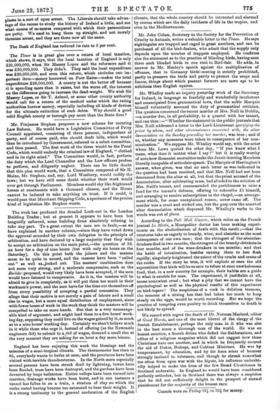The week has produced the dreaded Lock-out in the London
Building Trades ; but at present it appears to have been but languidly enforced, some building firms absolutely refusing to take any part. To a great extent the men are in fault,—as we have explained in another column,—since they have voted down the approval accorded by their own delegates to the principle of arbitration, and have declared by a large majority that they wish to accept no arbitration on the main point,—the question of 9d. an hour for a day of nine hours (but with only six hours on the Saturday). On this point both the joiners and the masons seem to be quite in accord, and the masons have been "called out " as well as.jocked out. The masters' combination does not seem very strong, and a moderate compromise, such as the Builder proposed, would very likely have been accepted, if the men would have listened to compromise. As it is, the masters will be afraid to give in completely, as it will put them too much in their workmen's power, and the men have for the time cut themselves off from every possibility of accepting a partial concession. They allege that their motive is not merely a gain of leisure and a small rise in wages, but a more equal distribution of employment, since with fewer hours of work in the week they think the masters will be -compelled to take on more hands. But that is a very unmanage- able kind of argument, and might lead them to a five hours' work- ing day, supposing they could live on the wages gained by it, as much as to a nine hours' working day. Certainly we shan't believe much in it while those who urge it, instead of offering (as the Newcastle engineers did) to submit to a fall of wages, demand a small rise at the very moment they are asking for an hour a day more leisure.


































 Previous page
Previous page